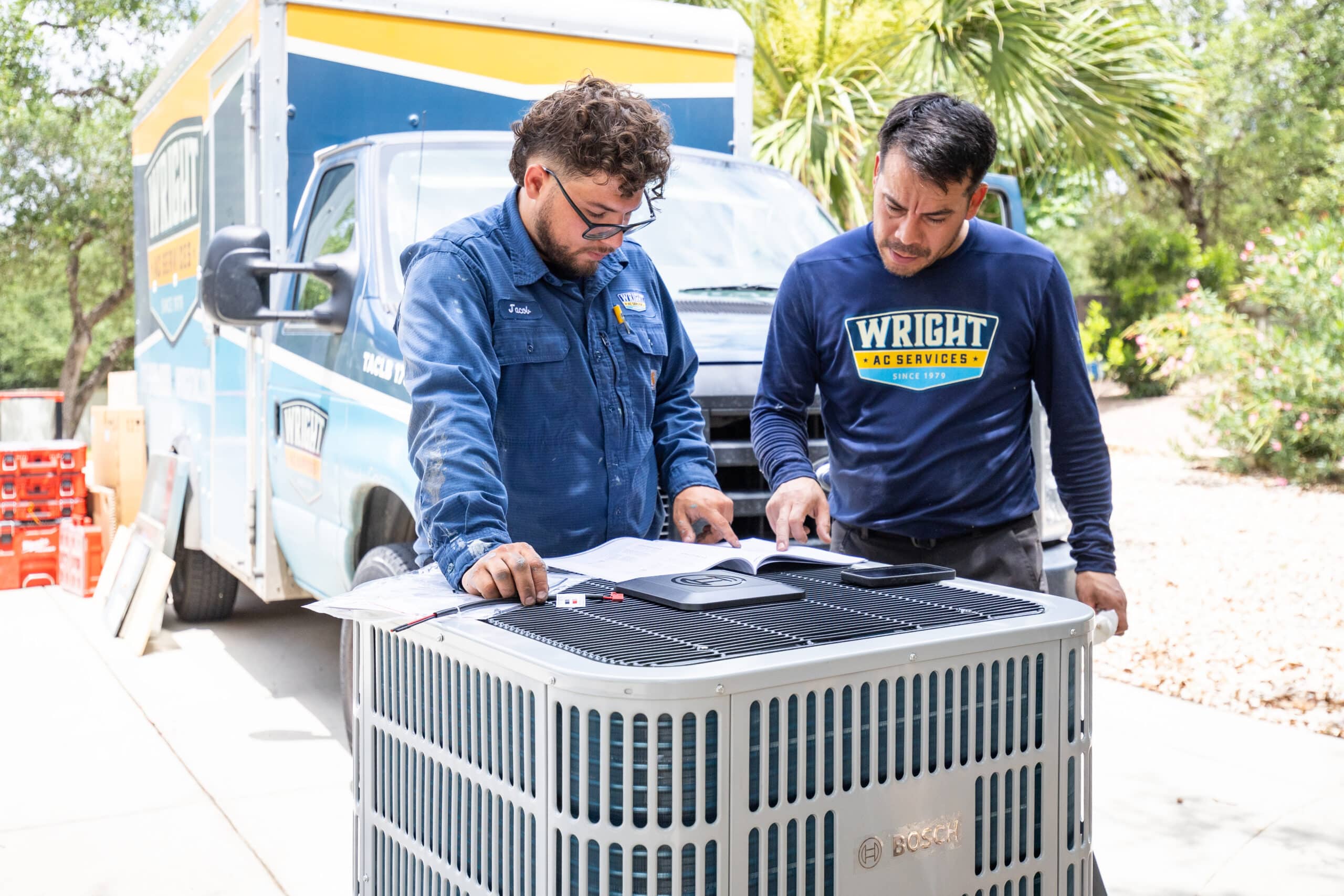In this article…
- 5 Common Reasons Your AC Freezes in the Summer
- Warning Signs Your AC Might Be Freezing Up and What To Do
- How to Prevent AC Freezing in the Future
There’s nothing worse than walking into your home on a scorching summer afternoon, expecting crisp, cool air, only to realize your air conditioner is frozen and blowing warm air.
A frozen AC might sound like something that should help in the summer, but it’s actually a sign something’s gone wrong, leaving you with no relief from the heat. And if it keeps happening, it could mean higher energy bills, expensive repairs, or even a full system breakdown.
If this has happened to you before, you probably fear it will happen again. You want to know what causes your AC to freeze up and what you can do to prevent it.
At Wright Home Services, we’ve been helping San Antonio homeowners stay cool and comfortable throughout every season for over 45 years.
We understand that the last thing you want is your AC to go out in the middle of the summer, because we’ve been there.
Luckily, our team of expert, certified HVAC technicians are here to provide you with high-quality solutions and educate you on all your need to know regarding your air conditioning.
So, in the midst of summer, it’s important to understand common reasons why your AC isn’t working and what you can do to potentially prevent it.
This article will outline common reasons why your AC is freezing up during a heat wave, what to do when it happens, what you can do to help prevent it, and when you should call a professional.
5 Common Reasons Your AC Freezes in the Summer
If your AC stops working during the hottest parts of the day, after the initial feeling of frustration, you first wonder…why and how did this happen?
So, what causes your AC to freeze up during the hottest months of the year? Let’s break it down.
1. Poor Airflow
Your air conditioner relies on consistent airflow to keep the evaporator coil from getting too cold. When airflow is restricted, the coil can’t absorb enough heat, and any condensation on it begins to freeze.
Common airflow problems include:
- Clogged or dirty air filters that restrict airflow
- Blocked or closed air vents preventing circulation
- Dirty evaporator coils that reduce efficiency
- Crushed or leaking ductwork that disrupts airflow patterns
- Blower not working properly
Checking and replacing your air filter monthly during the cooling season is one essential maintenance tip to help avoid this issue.
Keep reading to learn more tips to avoid your AC from freezing up!
2. Low Refrigerant Levels
Low refrigerant (usually due to a leak) reduces the pressure inside your system, which can cause the evaporator coil to drop below freezing. As moisture in the air condenses on the coil, it turns to ice.
Warning signs of low refrigerant include:
- Hissing or bubbling sounds near the indoor or outdoor unit
- Weak airflow or warm air coming from the vents
- Ice on the refrigerant line or evaporator coil
- Signs of excessive oil at the outdoor unit
If you suspect low refrigerant, do not attempt to recharge the system yourself. Handling refrigerants requires a licensed HVAC technician, so you should call your trusted HVAC company to assess and refill refrigerant.
3. Thermostat Issues
Your thermostat tells your AC when to cycle on and off. If it’s malfunctioning, it might keep your AC running longer than necessary, overcooling the coil and causing freezing.
Some causes include a miscalibrated thermostat reading the wrong temperature, or a thermostat placed near a draft, window, or heat source, which throws off readings.
It’s important not to overwork your AC during the summer. This could lead to your system freezing up and shutting off.
Read more about the ideal temperature you should set your thermostat to during the summer!
4. Outdoor Temperatures Are Too Low
If you’re running your AC overnight or early in the morning when outdoor temps dip in the lower 60s, your system can struggle to regulate refrigerant flow. While not common here in San Antonio during peak summer months, it can be common in spring or late summer.
While it’s tempting to leave the AC running, it’s best to avoid doing so when it’s too cool outside, so keep this in mind once temperatures start to drop.
5. Mechanical or Electrical Failures
A few key parts can lead to freezing if they’re not working properly.
- Blower fan motor issues can prevent warm air from circulating over the coil
- Expansion valve or metering device problems can result in too much refrigerant reaching the coil
- Faulty sensors or relays can keep the unit running when it shouldn’t.
If any of these parts are failing, the only solution is professional repair.
Warning Signs Your AC Might Be Freezing Up and What To Do
How do you know your AC is freezing? Here are some telltale signs:
- Ice buildup on the refrigerant line or indoor coil
- AC blowing warm air or no air at all
- Water leaking near the indoor unit (from melting ice)
- Gurgling, bubbling, or hissing noises
- Reduced airflow from vents.
If you notice any of these issues, turn off your system right away to prevent further damage, and contact a professional HVAC company as soon as possible.
What to Do If Your AC Freezes Up
If your AC suddenly shuts off this summer, it’s important to follow these steps to properly care for your HVAC system and prevent more damage.
Step 1: Turn Off the System
This gives the ice a chance to melt. Leave the system off for several hours (or overnight if needed) and avoid running it until it’s fully thawed.
Step 2: Check Your Filter
A dirty air filter is one of the most common and fixable issues. If it’s clogged, replace it. This can help ensure your system doesn’t freeze up again in the future.
Step 3: Open All Vents
Make sure your vents and registers aren’t blocked by furniture, rugs, or curtains. Restricting airflow can cause a pressure imbalance within your system, causing it to work harder and shut down.
Step 4: Call a Professional
If ice keeps coming back or your AC still isn’t cooling, it’s time for an HVAC technician to inspect the system. Continuing to run a frozen system can damage your compressor or lead to a total breakdown.
How to Prevent AC Freezing in the Future
Now that you understand what causes your AC to freeze up, warning signs that it might happen, and what to do when it does happen, you want to know what preventative measures you can take to help minimize this risk in the future.
Prevention is always easier (and cheaper) than emergency repair. Think about it.
Would you rather regularly maintain your AC and feel confident it will keep you cool all summer long, or undergo an emergency shut-off and scramble to find a trustworthy HVAC company in a pinch?
The answer is pretty obvious. Here are some prevention tips we recommend to care for your AC and help avoid a random shutoff:
- Change your air filters every 1–2 months during cooling season
- Schedule regular AC maintenance in the spring and summer, or invest in an annual membership with an AC company
- Keep your vents open and unblocked to maintain airflow
- Avoid running your AC when it’s under 60°F outside or running it too low during peak temperatures
- Upgrade your thermostat to a programmable or smart model to better control system cycles
By taking precaution and caring for your AC well before summer hits, you can feel confident your system will keep you cool and comfortable.
One of the best ways to ensure your AC doesn’t randomly shut off or become overworked is knowing what temperature to set your thermostat to.
Does Your AC Need Summer Maintenance?
At Wright Home Services, we’re here to provide you with proper care for your HVAC system. Our expert HVAC technicians will catch issues like airflow restrictions, refrigerant leaks, and mechanical problems before they cause your system to freeze.
If your AC keeps freezing up, don’t ignore the problem. Frozen coils are more than an inconvenience. They’re a red flag that something in your system needs attention.


